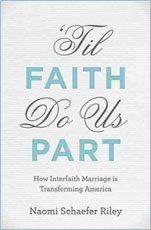"The rise of interfaith marriage is a bittersweet trend for American religious groups. On the one hand, it means that they are moving away from traditional practices, that their children will be less likely to be observant members of their faiths. On the other hand, it means that they are being thoroughly accepted into American society. Not only do large numbers of Americans seem happy to marry members of other religious groups, but when they do, they take their extended families along with them. Americans tend to have fonder feelings for a particular religious group after they have married one of its members. In general, the more contact someone has with a member of another religious group — through friendships or extended-family relationships — the more likely they are to have warm feelings for the group as a whole. Interfaith marriage has become an important vehicle for assimilation and a major driver of religious tolerance.
"I cannot claim to be an impartial observer of these trends. Nor am I rooting for the all-out victory of anyone of them either. America's history of assimilation and tolerance is the reason that I, the grandchild of Jewish immigrants from Eastern Europe, can have the life I do today. It is the reason I could marry the man I wanted to, without fear of being ostracized or worrying about whether my children would ever fit in.
"But the strength of America's religious communities is also an important contributor to this country's generosity and compassion, not to mention some of its most important founding principles. In other words, I would be sorry to see the waning of those religious traditions as a result of interfaith marriage. And it is certainly true that interfaith families are less likely to raise their children religiously. Those who do must often make real compromises on the way a faith is practiced. These are difficult trends for religious communities to weather.
"Then there is the institution of marriage itself, which has experienced its own decline in recent decades. My survey suggests that interfaith marriages are generally more unhappy — with lower rates of marital satisfaction — and often more unstable, with particularly high divorce rates when certain religious combinations are involved.
"My interviews, meanwhile, suggest that few Americans are aware of this problem. Interfaith couples tend to marry without thinking through the practical implications of their religious differences. They assume that because they are decent and tolerant people who don't have anything against people of another faith — and even commendably appreciate religious diversity in their communities — that they will not encounter difficulties being married to someone of another faith. Unfortunately, being in an interfaith marriage provokes conflicts and requires compromises that merely living near, working with, or being friends with someone of another faith does not.
"We might think of recent enlightened attitudes toward interfaith marriage as part of the racialization of religion — the belief that faith, like skin color, is a trait that need not divide us. Indeed, there are those who believe that only a bigot would pass over a spouse on religious grounds. But religious identity — even in a completely tolerant society — can and should be considered more substantively than racial identity.
"Like religion, marriage is also an important foundation of American life, and I would be sorry if too many people entered into marriages that were unhappy or unstable. For my own selfish reasons, as well as what I think are more broadminded ones, I hope it will be possible to find a balance — to keep religion and marriage strong while fostering a tolerant society. But there is reason for skepticism. Perhaps only a different vision of pluralism would be able to coexist with efforts to strengthen religion and marriage in the United States. Such a pluralism would seek to genuinely tolerate difference and cultivate a sense of civility between groups without falling prey to the idea that all religions are equally true or valuable — and would not minimize the importance of forging marriages around common beliefs and behaviors."
